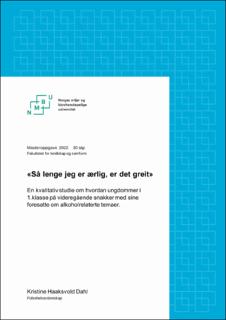| dc.contributor.advisor | Ingeborg Pedersen | |
| dc.contributor.advisor | Kristin Buvik, FHI | |
| dc.contributor.author | Dahl, Kristine Haaksvold | |
| dc.date.accessioned | 2023-02-08T17:36:56Z | |
| dc.date.available | 2023-02-08T17:36:56Z | |
| dc.date.issued | 2022 | |
| dc.identifier | no.nmbu:wiseflow:6671702:52490324 | |
| dc.identifier.uri | https://hdl.handle.net/11250/3049436 | |
| dc.description.abstract | Bakgrunn: Alkohol er vanlig blant norske ungdom, og det er også den yngre delen av befolkingen hvor blant annet helgefyll er mest vanlig. Ungdommer er derfor en sårbar gruppe for flere av skadevirkningene av alkohol, og alkoholbruk er den største risikofaktoren for tap av friske leveår hos yngre mennesker. Samtidig viser undersøkelser at ungdommer i dag debuterer senere med alkohol og drikker mer moderat. Da foresatte har en påvirkende rolle i ungdommers drikkemønster, har foresatte blitt pekt ut som en av flere årsaker til endring i drikkekultur hos ungdommer i dag. Ved å se nærmere på hva det er som preger samtalene mellom ungdommer og foresatte når det kommer til alkoholrelaterte temaer, og hvordan ungdommer opplever å bli påvirket av foresatte holdninger, vil man kunne innhente mer kunnskap om hvordan foresatte i dag er med på å påvirke ungdommers valg rundt alkohol.
Metode: Kvalitative, semistrukturerte dybdeintervjuer fra «Mitt liv» undersøkelsen, med et utvalg på 20 elver som går i 1.vgs, fra flere lokalisasjoner i Norge. Rekrutering, intervju og transkribering er utført av forskere ved FHI.
Resultater: Analysen førte til tre hovedtemaer: Gode familierelasjoner, gode relasjoner med foresatte er med på å skape åpen samtale rundt alkohol som preges av tillitt, ærlighet og gjensidighet. Engasjerte foresatte, foresatte har en delaktig rolle i ungdommers sosiale liv, gjennom å kjøre/levere, kjøpe alkohol og tillate fester, samt legger opp til å ha kontakt med hjemme når ungdommene er ute. Foresattes holdninger, regler og holdninger som foresatte har rundt alkohol, er viktig for ungdommer å overholde.
Konklusjon: Funne i studien viste at foresatte spiller en viktig rolle i hvordan valg ungdommer tar rundt alkohol, også på videregående skole. Samtaler mellom foresatte og ungdommer om alkohol er relasjonsbasert, hvor tette relasjoner bidrar til åpne samtaler rundt alkohol, som er basert på tillitt og gjensidighet. Det er også samarbeid mellom ungdommer og foresatte når ungdommer er ute med venner, som handler om at foresatte har oversikt og kan være til stede. Ungdommer lytter til råd foresatte har rundt alkohol og foresattes holdninger er med på å påvirke hvordan valg ungdommer tar rundt alkohol. | |
| dc.description.abstract | Background: Alcohol is common among adolescence in Norway. It is the younger part of the population where things like the so-called «weekend drunkenness» takes most place, and young people are therefore a vulnerable group for several of the harmful effects of alcohol, particular to damages such as accidents, injuries and violence. Alcohol in Norway today is the biggest risk factor for the loss of healthy years of life in younger people. At the same time, research shows that adolescence today's start drinking alcohol later and drink more moderately compared to previous generations. Parents have an influential role in young people's drinking pattern, and have been seen as one of several reasons why we see this changes in adolescence drinking habits . By looking more closely at what characterizes the conversations between adolescence and parents regarding alcohol-related topics and have a look at how adolescence speeks about being influenced by their parents view on alcohol, it might be possible to obtain more knowledge on how parents today help to influence adolescence choices around alcohol.
Method: A semi-structured qualitative interview was used as method. The dataset was from the "Mitt liv" survey from FHI, with a sample size of 20 participants from upper secondary school, from several locations in Norway. Recruitment, interviews and transcription were all conducted by researchers at FHI.
Results: The analysis showed three themes: Good family relationships, help to create an open conversation about alcohol that is characterized by trust, honesty and reciprocity. Involved parents; an active role in the social life of the adolescent, through driving/delivery, buying alcohol and allowing parties, as well as making arrangements to have contact when the young people are out. Parents view on alkohol are important for adolescence own choices on alcohol and the perception of the choice other adolescencens do regarding alcohol.
Conclusion: Findings in the study showed that parents play an important role in adolescencens choices on alcohol, also at upper secondary school. Conversations between parents and adolescence about alcohol are relationship-based, where close relationships contribute to open conversations about alcohol, which are based on trust and reciprocity. There is also cooperation between young people and parents when young people are out with friends, which is about parents having an overview and being able to be present when necessary. adolescence listen to their parents' advice about alcohol and their parents' s view on alcohol helps to influence the choices make about alcohol. | |
| dc.language | nob | |
| dc.publisher | Norwegian University of Life Sciences | |
| dc.title | "Så lenge jeg er ærlig, er det greit". En kvalitativ studie om hvordan ungdommer i 1.klasse på videregående snakker med sone foresatte om alkoholrelaterte temaer | |
| dc.type | Master thesis | |
